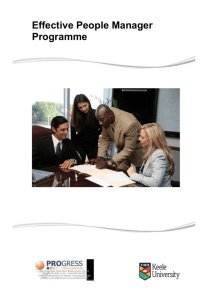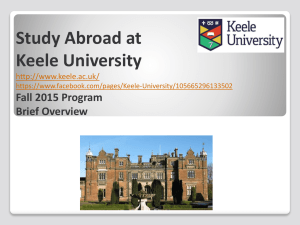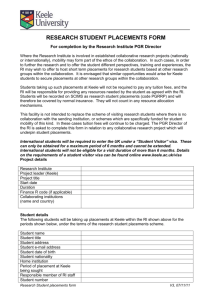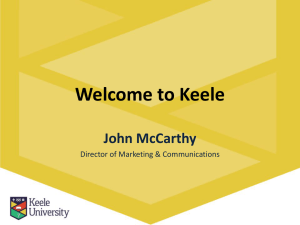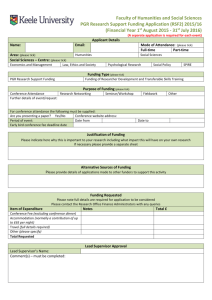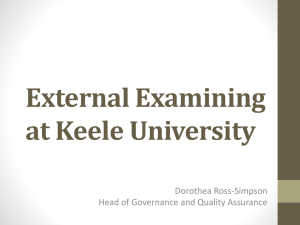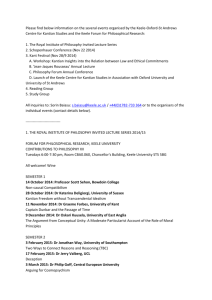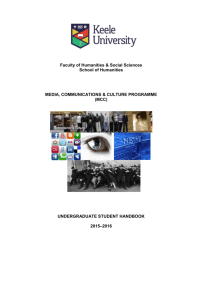Learning and Teaching Conference Programme
advertisement
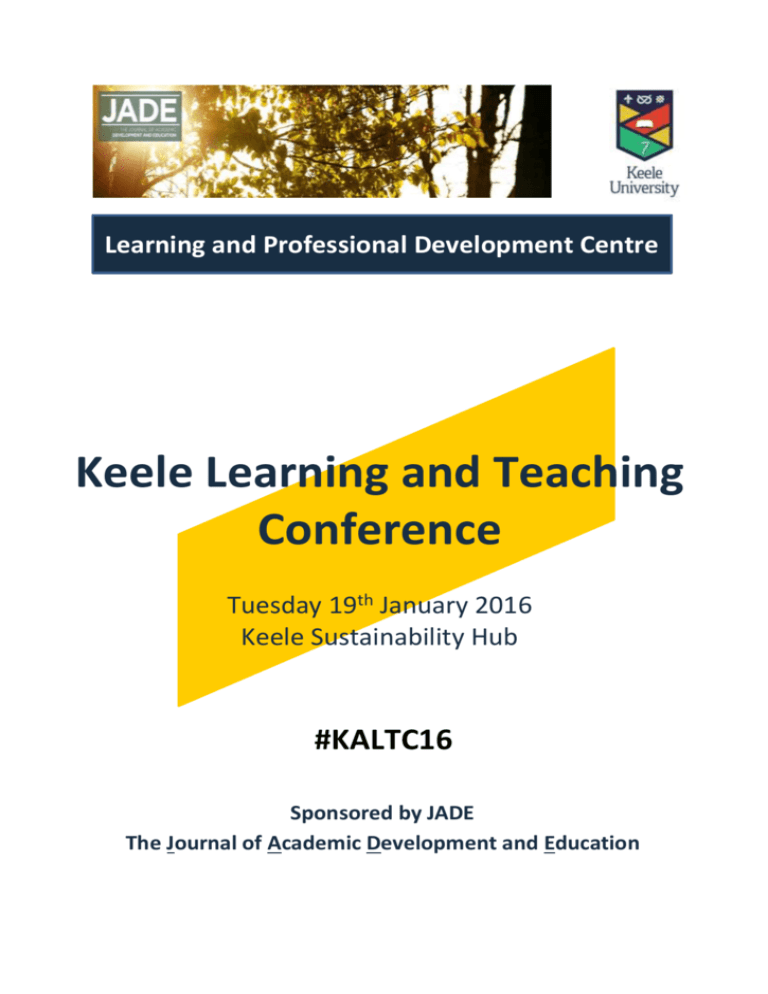
Learning and Professional Development Centre Keele Learning and Teaching Conference Tuesday 19th January 2016 Keele Sustainability Hub #KALTC16 Sponsored by JADE The Journal of Academic Development and Education Introduction As a complementary event to the Annual Teaching Symposium, the LPDC, in collaboration with PVC (Education and Student Experience) Prof. Fiona Cownie, have created the Keele Learning and Teaching Conference. The conference is taking place on Tuesday 19th January in the Lecture Theatre at Keele Sustainability Hub, between 9.00am – 15.30pm. Refreshments and lunch will be available to attendees throughout the day. All members of staff and students with an interest in learning and teaching are warmly invited to attend. The Keele Learning and Teaching Conference has no theme and thereby offers all members of the University the opportunity to exchange ideas and share innovative and inspirational practice. The format of the conference will be short (15 minute) presentations with time allowed for questions and discussion as well. Abstracts plus an event report will be published in the August 2016 edition of the Journal of Academic Development and Education (JADE). We look forward to seeing you there! Running Order Lecture Theatre 9.00 – 9.30am Registration & Refreshments 9.30 – 9.45am Welcome Professor Fiona Cownie Assertiveness in Specialist Practice Dr Julie Green What is liberal arts education and is it a good idea? Dr Jonathan Parker Factors for Consideration in Learning Analytics; An Investigation into Student Activity on an MLE Dr Ed de Quincey 9.45 – 10.00am 10.00 – 10.15am 10.15 – 10.30am 10.30 – 10.50am Break & Refreshments 10.50 – 11.05am Enhancing engagement and learning through mixed method teaching Dr Sarah Aynsley Team Based Learning – take one academic, a class of students and scratch cards! Dr Graeme Jones Defining and Supporting the Scholarship of Teaching (SoTL) Dr Jackie Potter Transforming feedback to International Students with Snaggit Ms Ella Tennant 11.05 – 11.20am 11.20 – 11.35am 11.35 – 11.50am 12.00 – 12.40pm Lunch 12.40 – 12.55pm First year students – they’re all the same really Dr Christopher Little and Ms Jayne Eagles On a need to know basis: “Electronic” vs “Live” Tutor Briefing Dr Russ Crawford A Chinese Puzzle; experiences of a UK – China teaching collaboration Dr Martin Rowley and Dr Yvonne Skipper 12.55 – 13.10pm 13.10 – 13.25pm 13.25 – 14.00pm Break & Refreshments 14.00 – 14.15pm PURPLE PENS: A low-cost self-assessment method for improving assessment, literacy and feedback Dr David McGarvey PlayBack; the story so far Mr Dan Harding, Mr Matt Street, Dr Jonathan Knight and Dr Katherine Haxton Talking Chemical Dr Katherine Haxton Diagnosis: Progress Dr Katherine Haxton Close 14.15 – 14.30pm 14.30 – 14.45pm 14.45 – 15.00pm 15.00pm 1 2 3 4 5 6 7 8 9 10 11 12 13 14 Abstracts Assertiveness in Specialist Practice Dr Julie Green The Specialist Community Nursing (District Nursing (DN)) BSc / PG Diploma course here at Keele School of Nursing & Midwifery aspires to be ‘transformational’, enabling future DNs to lead and support complex care in a variety of community settings (DH, 2013). This presentation aims to describe what makes our course meet this optimistic goal. Care in the community is undergoing considerable ‘modernisation’, which has expanded the remit of DN teams (QNI, 2013; DH, 2013, RCN, 2013). In this environment it is essential that the DN is an assertive and inspirational manager who leads her team effectively, ensuring prioritised allocation of visits and successful negotiation with the wider multi disciplinary team. Curriculum content has been reviewed and a theme of assertiveness strengthened, including the implementation of pedagogical interventions. Alongside these curriculum developments, the students have completed an assertiveness questionnaire (Begley and Glacken (2004) at the start of their 12-month full time course and after each trimester, for their own personal information. Students have had their scores released to them at the end of the course. This presentation will identify specific learning and teaching strategies that have enhanced the fostering of assertiveness skills and have impacted on student scores and personal performance. Page | 1 What is liberal arts education and is it a good idea? Dr Jonathan Parker Liberal arts is a term that is widely used in higher education circles, but it is used to describe a large number of ideas. What do people actually mean when they speak of a liberal arts education? What are the advantage and disadvantages of this approach? This session will explore what it means in practice both in the UK and internationally. There has been a rapid expansion of liberal arts degrees in the UK, and these developments will be compared with the growth of liberal arts internationally. Page | 2 Factors for Consideration in Learning Analytics; An Investigation into Student Activity on an MLE Dr Ed de Quincey Traditionally a student’s progress and engagement have been measured by assessment and attendance. However, in a student’s day-to-day interactions with a University, other real-time measures are being generated e.g. VLE interaction, Library usage etc., with HE now gathering an “astonishing array of data about its ‘customers’” (Siemens & Long, 2011). The analysis of this data has been termed Learning Analytics (LA) (Johnson et al., 2013) and has the potential to identify at-risk learners and provide intervention to assist learners in achieving success (Macfadyen & Dawson, 2010). This presentation will include a statistical analysis of the usage data of a bespoke Managed Learning Environment (MLE). Server log data generated by 2,634 students has been collected with 2,544,374 interactions being recorded. Previous analysis (de Quincey and Stoneham, 2013) has suggested significant correlations between pairs of attributes such as views of lecture materials and final coursework mark. A clustering algorithm has now been applied to a subset of the data in order to identify the behaviours of the most prominent clusters of students. These characteristics will be discussed along with exceptions to the expected behaviours of successful students. Implications for LA usage at Keele will also be considered and initial findings from an ongoing TIPs funded project into LA. Page | 3 Enhancing engagement and learning through mixed method teaching Dr Sarah Aynsley Immunology is the study of the immune system; a complex combination of cells and factors which protect our bodies from infection, it is also a subject that many students struggle to understand. However as the immune system is involved in the progression of many diseases a good understanding of the topic is essential for medical students. At Keele immunology is taught predominantly in the first and second years, unfortunately in the second year the dedicated time to teach immunology is much reduced and many students struggle to assimilate the new information with that learnt in first year. The aim of this project was to maximise the effectiveness of the second year teaching in order to enhance engagement and understanding. Using an action research approach changes were made over a three year period utilising principles in small group teaching and technology enhancing learning. The primary method of analysis was through online questionnaires for the students and semi-structured interviews for staff. Small successes were observed in the early cycles with changes to staff student ratio and the introduction of focused questions. The implementation of video resources to recap first year knowledge in the third cycle allowed students to better engage with the new information and staff saw an increase in engagement and understanding reflected in exam score. Whilst the interventions were applied in medicine the recommendations and findings from this project could apply to any complex subject. Page | 4 Team Based Learning – take one academic, a class of students and scratch cards! Dr Graeme Jones In collaboration with Dr Laura Hancock, Chloe Harold and Tessa Phillips Chemistry, School of Physical and Geographical Sciences, Keele University Team Based Learning (TBL) has been described by Sweet as ‘A special form of collaborative learning using a specific sequence of individual work, group work and immediate feedback to create a motivational framework in which students increasingly hold each other accountable for coming to class prepared and contributing to discussion.’ Following a pilot study in 2014 and the award of a Teaching Innovation Project in 2015 we have introduced TBL into a number of Chemistry modules. In some the TBL sessions have taken the place of lectures, in others they have provided a framework for whole cohort problem classes. This presentation will cover the theory of TBL, our experiences of the RAP, the IF-AT and Application Activities and most importantly we will tell you what these terms mean. Finally we will present initial comparative data into the impact of using TBL on student performance in assessments from Semester 1 2015/16. TBL is an interesting teaching tool which may help develop the questioning and reasoning minds that we all strive for in our students and encourage them to become active learners. All the resources are available on campus for fellow academics to give TBL a go – if it tickles your fancy then give us a call. Page | 5 Defining and Supporting the Scholarship of Teaching (SoTL) Dr Jackie Potter This presentation reports the methods and findings of an HEA-funded study to understand definitions and support for SoTL among Higher Education Providers in the UK. The work draws on a review of international literature published in the past 10 years, a sector-wide survey of Heads of Educational Enhancement (including a desk-top review of web-based materials) and interviews with Heads of Educational Enhancement, Student Leaders and Students. SoTL is exposed as a contested notion with a multiplicity of understandings that is widely supported in all responding institutions. This presentation provides key outcomes of each of the differing research work streams (literature review, survey and interviews) and has a main focus is on the high level, integrated recommendations that arise from the work for academics engaged in SoTL, for institutions that aim to support SoTL and for the sector as a whole. The presentation will be of interest to academic colleagues who engage in the scholarly pursuit of improving teaching and learning and may extend and challenge pre-existing ideas of ‘what counts’ as SoTL. Page | 6 Transforming feedback to International Students with Snaggit Ms Ella Tennant Research has shown that the integration of technology in teaching in higher education is now recognised as fundamental if best practice is to be achieved (Bates and Poole, 2003). While some colleagues still prefer to retain ‘tried and tested’ paper-based curricula, assessment submissions and written feedback, comments in Module Evaluations on English for Academic Programmes shows that not all students are entirely satisfied with the quality of feedback provided. A pilot study using screen-capture software, Snaggit, with Turnitin to provide feedback to students on their assessed work, was conducted on two English for Academic Purposes modules. I felt that providing online audio feedback to students on English Language modules would increase student satisfaction and make the assessment and feedback process more effective overall. This case study will discuss how I have been successful in integrating the use of technology into the learning process on English Language courses, with the main focus on a pilot study I started using Grademark and Snaggit with Turnitin to provide feedback to students on their assessed work. 100% of respondents agreed that they found the screencast/audio feedback very helpful, 87% of respondents agreed that it was motivating to hear the tutor discuss the work and 93% said they listened to the recorded feedback rather than just look at the grade. The responses indicate that online screen-cast feedback has contributed to making the assessment and feedback process more effective overall and to increasing student satisfaction. Page | 7 First year students – they’re all the same really Dr Christopher Little and Ms Jayne Eagles In the 2014/15 academic year, the Student Learning team collected data concerning the transitional issues and anxieties faced by 1st year undergraduate students. This data, collected from 502 students across all three faculties, raises some interesting points around transitions into HE, confidence in key study skills and awareness of central study support that we would like to share with colleagues. From the data we collected, and continue to collect in the 2015/16 academic year, we have found that first year students have the same anxieties across faculties, schools and cohorts and at different points of the first undergraduate year of study. This data was collected using Socrative, a web-based student response system, and will be presented using the same software. Therefore, this presentation will offer two distinct learning points. Firstly, a live demonstration of software that not all colleagues will be aware of, thus potentially offering a new teaching tool to fellow professionals. Secondly, and most importantly, it seeks to engage colleagues in a discussion around just how difficult coming to university can be, and what their role in supporting this transition may be. Page | 8 On a need to know basis: “Electronic” vs “Live” Tutor Briefing Dr Russ Crawford The aim of this study was to question 11 different subject-specialist medical school staff of various teaching experience levels and explore their perceptions of the benefits and drawbacks of adopting an electronic tutor briefing format rather than the traditional face-to-face meetings used in support of tutors during modules on the Medical curriculum. The findings of this study show that whilst the electronic tutor briefing intervention is successful in supporting tutors in their teaching, the evidence suggests it is unsuitable for a wholesale replacement of the “live” briefings in its current state. My findings suggest additional research is needed to fully address the relatively few identified shortcomings of the electronic tutor briefing system towards making it a sustainable alternative to “live” tutor briefing in the future. Page | 9 A Chinese Puzzle; experiences of a UK – China teaching collaboration Dr Martin Rowley and Dr Yvonne Skipper This talk will provide some insight into the experiences of staff and students involved in a teaching collaboration between the School of Psychology at Keele University and Ludong University in China. The teaching collaboration takes the form of an articulation agreement whereby Chinese students study Keele ‘bridging’ modules for Year 1 and 2 of their degree, which take the form of 2 week intensive teaching in China as well as distance learning modules. These modules are designed to scaffold their entry into Keele University in Year 3, whilst continuing to study for their Chinese degree award. These kinds of collaborations are becoming more common among universities, however, to date, there is very little research examining how students and staff feel about these collaborations. Therefore, we have little understanding of the feelings and attitudes of both staff and students who are participating in these programmes and the current study aimed to further our understanding of these ‘on the ground’ experiences. Staff and students were surveyed prior to engagement with the course and the first cohort of students was surveyed again at the beginning of their second year. We asked respondents about their course-related attitudes as well as their expectations and experiences. Their responses highlight some of the challenges faced in designing and running such collaborations. The talk will conclude with a brief discussion of some of the ways in which the School of Psychology has attempted to meet these challenges in the context of findings from other UK-China collaborations. Page | 10 PURPLE PENS: A low-cost selfassessment method for improving assessment, literacy and feedback Dr David McGarvey Chapter B6 of the UK Quality Code for Higher Education articulates indicators of sound practice that provide the basis for effective assessment [1]. Indicator 6 (developing assessment literacy) suggests ‘Staff and students engage in dialogue to promote a shared understanding of the basis on which academic judgements are made’ [1]. An elegant discussion of effective practical approaches to such activities through a dialogic feedback cycle is provided by Beaumont et al [2]. During 2015-16 I have employed a tutor-led dialogic self-assessment cycle for lowstakes assessments in chemistry to improve assessment literacy and feedback. In this intervention students: (i) submit their work (ii) the tutor surveys a representative sample of the class work to inform the feedback (iii) work is returned to students during a timetabled session (iv) students are then issued with a coloured (purple pen) (v) the tutor goes through the assessment engaging in dialogue with the class, during which the students mark their own work and write their own feedback using the purple pens (vi) scripts are collected in to record the marks and view the students’ written feedback (vii) work is returned to students. Benefits of this approach include timeliness, opportunities for dialogue and engagement with feedback and efficiency. Page | 11 PlayBack; the story so far Mr Dan Harding, Mr Matt Street, Dr Jonathan Knight, and Dr Katherine Haxton Put simply, Playback is the routine recording of lectures with the intention of making them available to students after the event. The system being developed at Keele has focussed on audio recordings, synced with the presentation delivered and published to the KLE. The aim of the pilot is to evaluate the chosen technology and to determine what impact lecture capture has on the student learning experience at Keele. Schools from all 3 faculties have been involved during semester 1, 2015/16. Although it is accepted that evidence linking lecture capture to improved student performance is limited, recording lectures does have a number of widely accepted benefits. This includes allowing students to revisit topics they were unsure of, facilitating alternative modes of delivery (e.g. the flipped classroom) and as a valuable resource for students with different learning requirements or for whom English is not their first language. The purpose of this session is to update colleagues on the progress of the pilot and to encourage feedback that will help to shape the development of PlayBack. It will include speakers from academic, support and technical roles who have all been involved in the project from its inception to its current state. Page | 12 Talking Chemical Dr Katherine Haxton The language that we use to describe things is key to aiding comprehension, conveying meaning and provoking a response. The words we use to describe every day things take on greater importance when safety and health are the issues at stake. In particular, the words used to describe chemicals is an emotive topic, with broad impacts on laboratory safety in science and health disciplines, through to the emotional manipulation through ‘scare stories’ in the media. The aim of the study being presented is to evaluate the impact of chemistry education on how we respond to the names we give to substances. Various undergraduate students have been surveyed by a short questionnaire involving ranking names of substances as safe or unsafe, natural or synthetic, and known or unknown (to the person). Free text questions have been used to investigate understanding of key terms such as chemical. Initial findings show that familiarity with the name of a substance increases the perception that it is safe, and that the term ‘chemical’ is subject to multiple definitions depending on the context. This has key implications for the running of laboratory classes and broader implications for the public understanding of science. Page | 13 Diagnosis: Progress Dr Katherine Haxton Evaluation of learning gains is a key area of interest with the impending Teaching Excellence Framework. It is also a critical factor in evaluating the success of teaching innovations or justifying the continuation of existing teaching practice. One method of evaluating learning gains is to develop a series of assessment instruments (diagnostic tests or concept inventories) that allow accurate and valid assessment of a students' pre- and post- intervention knowledge. These instruments are generally multiple-choice and must have distractor answers that represent typical misconceptions held by students. Incoming 1st year students come from a diverse range of educational backgrounds and assumptions about what students do and do not know lead to many issues in early classes. The aims of this work are to develop a robust diagnostic test for 1st year chemistry students. A series of short MCQ tests have been developed in the area of general chemistry and spectroscopy with space provided for detailed written responses to justify the selected answers. Analysis of these responses is the first step in the development of a series of assessment instruments suitable for 1st year chemistry. This presentation will present the preliminary analysis and outline the next steps required in the development of robust and valid instrument. Page | 14 59/60 The Covert, Keele University www.keele.ac.uk/lpdc | lpdc@keele.ac.uk | 01782 733007
